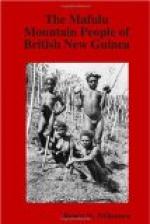Eleventh: Next comes the general distribution among the guests of the vegetables and fruits, including all those which have been hung up and displayed, as above described, and the ine fruit, prepared in two ways, and malage fruit. Every male guest who has joined in the real dance is, speaking generally, entitled to have a share; though sometimes, where there are two or three members of one family, shares may be given to one or two of them only, instead of to each. The chiefs of the community giving the feast work together in carrying out the distribution. The various things are collected into a number of heaps about the village, the number of heaps corresponding to the number of portions to be distributed; and each heap contains something of everything. Excluded from these heaps, however, are the ine seeds which have been put on strings and preserved separately, as before explained. For these are erected stakes about 10 feet high, round which the strings of seeds are twined. The number of these stakes is less than the number of heaps, because they are only planted near to the heaps which contain none of the ine fruit prepared the other way, so that each dancing guest gets some of this fruit, done in either one way or the other. Then the chiefs of the hosts’ community stand round one of the heaps and shout wildly, calling upon the recipient. This may be done by name, or it may in the case of a chief be done by the name of a spot, say a mound or hollow, adjoining the village from which he comes. Here, again, priority is given first to chiefs, and next to important personages. The man so called upon comes running forward with his wife or another woman, picks up his vegetables and fruit, and runs back again with them. Then the chiefs go on to another heap, and again afterwards to the others, one by one, going through the same process in each case, until everything has been distributed. Some of the women then go back to their own villages, carrying with them a portion of the food which has been given to their husbands, but leaving the rest with the latter. Sometimes some of the guest men go home also. But anyone who is proposing to return to the village of the feast must leave some of his food, or bring food on his return, as no more will be given to him.
Twelfth: The next stage is the collection of the village pigs. This may take some time, as many of them are running about in the bush, and have to be caught; and some of them have been agisted out as above mentioned, and have to be fetched. This may involve a delay of a week or ten days, during which most or all of the guests remain, sleeping in their guest houses at night, and perhaps roaming about among other villages in the neighbourhood by day. During this interval there is neither singing nor dancing.
Thirteenth: The village pigs are all brought in alive, and placed under the houses of the village, each pig having its legs tied up and being tied to the house. When all is ready, the chief of the clan announces that the killing of the pigs will take place on the following morning.




